During Pakistani Foreign Secretary Amna Baloch‘s recent visit to Dhaka, Bangladesh demanded $4.52 billion in pre-independence asset claims. In the meeting, which came after a decade and a half of stagnant relations, Dhaka also called for a formal apology for the genocide committed during the 1971 Liberation War. At the same time, Dhaka said that Pakistan ‘agreed’ to continue discussions on these issues.
However, the statement received from Pakistan at the end of the discussed meeting did not address Bangladesh’s demands for apology and reparations.
Imran Ahmed Siddiqui, additional secretary for Asia and Pacific Affairs at the Pakistani foreign ministry, was approached to comment on Islamabad’s position on this issue. The diplomat served as Pakistan’s High Commissioner to Bangladesh from 2020 to 2023. He told Daily Jugantor that Pakistan believes Bangladesh’s claims have been ‘resolved under established agreements.’
Abdul Majid Chowdhury, sub editor of Jugantor Online’s international desk, conducted the interview via email, where Siddiqui was asked about his much-discussed meeting with former prime minister Sheikh Hasina in the past. However, he did not provide specific response about that meeting, citing ‘diplomatic courtesy’. Instead, he spoke about various regional issues.
Q1. Bangladesh has demanded $4.52 billion in pre-1971 assets from Pakistan and claimed a formal public apology for 1971. Bangladeshi authorities raised this issue at the FOC-level meeting. What could be the position of Islamabad in this regard?
Answer: The resumption of FOC after 15 years marks a meaningful step in Pakistan-Bangladesh relations. The dialogue was constructive and forward-looking, with both sides articulating their positions, including on matters Pakistan considers resolved under established agreements.
Q2. This is the first FOC-level meeting held in Dhaka since 2010. Are you confident that meetings at this level between the two countries will continue regularly after an elected government comes to power in Bangladesh?
Answer: There is no reason for the FOC not to continue. It remains a valuable channel for deepening engagement and advancing mutual interests.
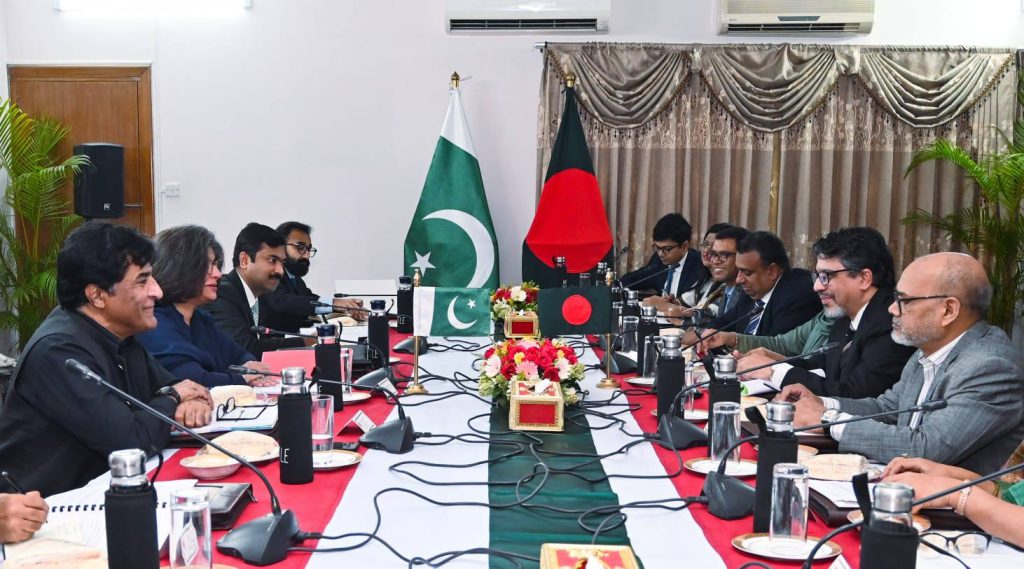
Bangladesh-Pakistan Foreign Secretary-level meeting in Dhaka, April 17. Photo: Collected
Q3. During your tenure as Pakistan’s High Commissioner to Bangladesh, you met former Prime Minister Sheikh Hasina in 2020 to strengthen Dhaka-Islamabad relations. However, reports suggest she was reluctant to engage with Pakistan and often sought India’s guidance on bilateral matters. It was a ‘rare meeting’ between Pakistan’s envoy and the former Prime Minister despite hostile political rhetoric and an unfriendly bureaucracy. From your experience, how would you describe her perspective on Pakistan, and what was the nature of that interaction?
A: Despite past challenges, it is essential to focus on the future and the immense potential for cooperation and collaboration between the two brotherly countries. We share a rich cultural heritage. There are significant opportunities to strengthen our ties across multiple sectors, from trade and investment to regional cooperation and development as well as people to people contacts. With a spirit of friendship and the will to address common challenges, there is no limit to what can be achieved. The future holds great promise for both countries, and it is this future that we must prioritise, setting aside past challenges in favor of a common vision for growth and peace.
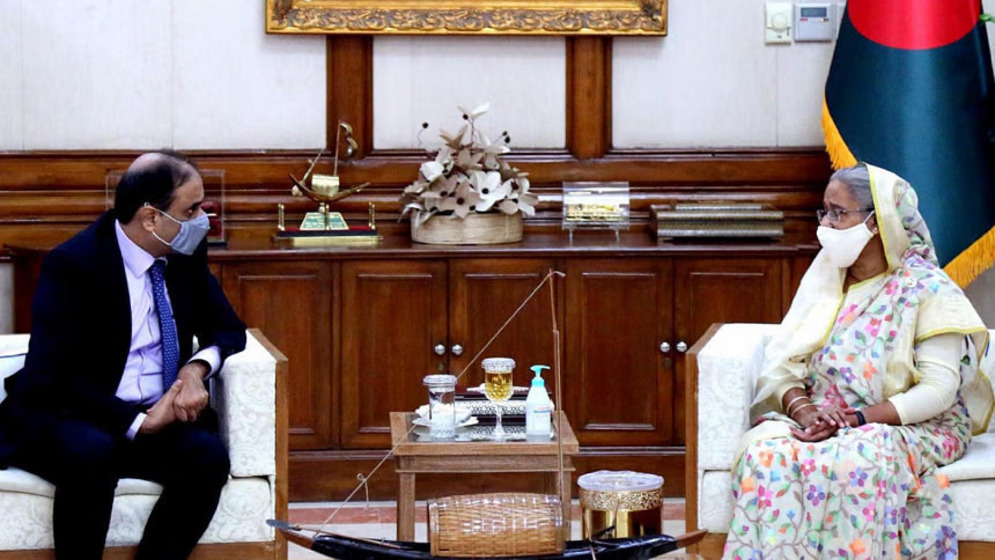
In 2020, Former Pakistani High Commissioner Imran Ahmed Siddiqui met with former prime minister Sheikh Hasina. Photo: Collected
Q4. When Sheikh Hasina fled to India, we saw the Indian leadership hold an all-party meeting to discuss Bangladesh’s political situation. Given Pakistan’s long-standing interest in rebuilding ties with Dhaka, was there a similar high-level discussion in Pakistan regarding Bangladesh’s political transition? Furthermore, could Pakistan have anticipated such a change in Bangladesh’s political landscape?
Answer: We remain committed to promoting a relationship with Bangladesh that is built on mutual respect, trust, and shared aspirations for development and regional peace. As a brotherly state, Pakistan continues to follow developments in Bangladesh with goodwill. It is hopeful that the people of Bangladesh will chart a course that ensures their continued progress and prosperity.
The political landscape in any country is shaped by its own unique historical and domestic realities. The ultimate decisions rest with the people of that country. Pakistan remains steadfast in its desire to deepen its engagement with Bangladesh, not just as a partner, but as a brotherly nation with whom we share an enduring and cherished bond.
Q5. With diplomatic barriers easing in the post-Hasina era, Pakistan’s Deputy Prime Minister and Foreign Minister Ishaq Dar is set to visit Bangladesh in April to enhance bilateral relations. What would you say is Pakistan’s highest objective from this engagement?
Answer: Pakistan views this upcoming visit as a historic opportunity, one that reaffirms the deep-rooted bonds of brotherhood between our two nations and sets the course for a renewed partnership based on mutual respect, cooperation, and shared prosperity.
Over the decades, Pakistan and Bangladesh have charted distinct yet complementary development trajectories, and there is much that we can learn from each other. This visit will serve as a bridge, reconnecting our nations on the path of economic collaboration, cultural exchange, and people-to-people ties. The highest objective, therefore, is clear: to turn a new page, one that focuses on what unites us.
Pakistan wishes to be a partner in Bangladesh’s continued progress, contributing to areas of mutual interest, from trade and investment to technology and human development
Pakistan wishes to be a partner in Bangladesh’s continued progress, contributing to areas of mutual interest, from trade and investment to technology and human development. The challenges of the 21st century demand regional cooperation, and Pakistan is ready to engage in a future-oriented dialogue that strengthens not only our bilateral ties but also regional cooperation. Much remains to be done, but this visit is a significant step towards that goal.
Q6. The Rohingya crisis continues to worsen, with China playing a significant role in regional dynamics. Given Pakistan’s strong ties with China, why has Pakistan not taken more proactive steps in supporting Rohingya repatriation efforts?
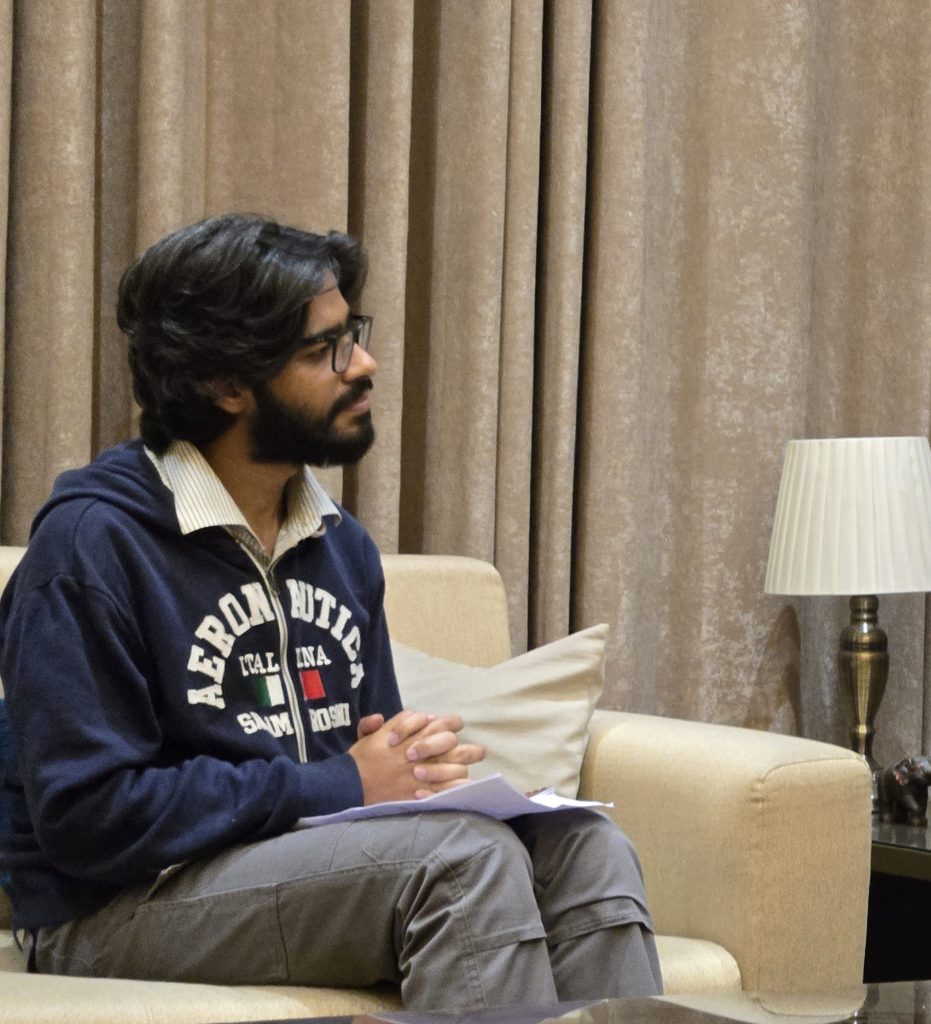
Answer: Pakistan has been consistently expressing its concerns about the plight of Rohingya community. In its capacity as the OIC Group Coordinator for Human Rights and Humanitarian Issues in United Nations, Geneva, Pakistan has been raising this cause at the relevant forums. It has also been supporting the OIC resolutions on the situation of the Muslim community in Myanmar for past several years. Pakistan believes that peaceful co-existence of all communities in Myanmar, with provision of fundamental rights, like citizenship, freedom to practice religions, education and security, is essential to peace, progress and prosperity of the country.
Q7. Despite India’s reluctance, there have been renewed discussions about reviving SAARC, with Muhammad Yunus advocating for its restoration. Since Pakistan has consistently supported SAARC’s revival, do you see any possibility of this happening in the near future?
Answer: Pakistan has long held the view that regional prosperity is best achieved through dialogue, cooperation, and the strengthening of institutions designed to serve collective interests. SAARC, envisioned as a platform for South Asian development and integration, must not be held hostage to self-serving objectives. Its revival is not merely an option – it is a necessity.
Pakistan welcomes all voices, particularly that of Muhammad Yunus, advocating for SAARC’s restoration. A functional and effective SAARC, free from artificial impediments, can be a powerful engine for economic growth, trade expansion, and sustainable development in the region. However, for this vision to materialize, all member states must demonstrate the political will to prioritize regional cooperation over discord.
Pakistan has long held the view that regional prosperity is best achieved through dialogue, cooperation, and the strengthening of institutions designed to serve collective interests
Bangladesh’s efforts to reinvigorate SAARC are commendable. Pakistan stands ready to support any initiative that breathes new life into this vital organsation. The challenges South Asia faces- economic vulnerabilities, climate change, and developmental disparities- demand collective solutions. A reinvigorated SAARC can be a force for regional stability and progress. It is time for all stakeholders to contribute meaningfully to this effort, recognizing that our shared future is far more important than our differences.
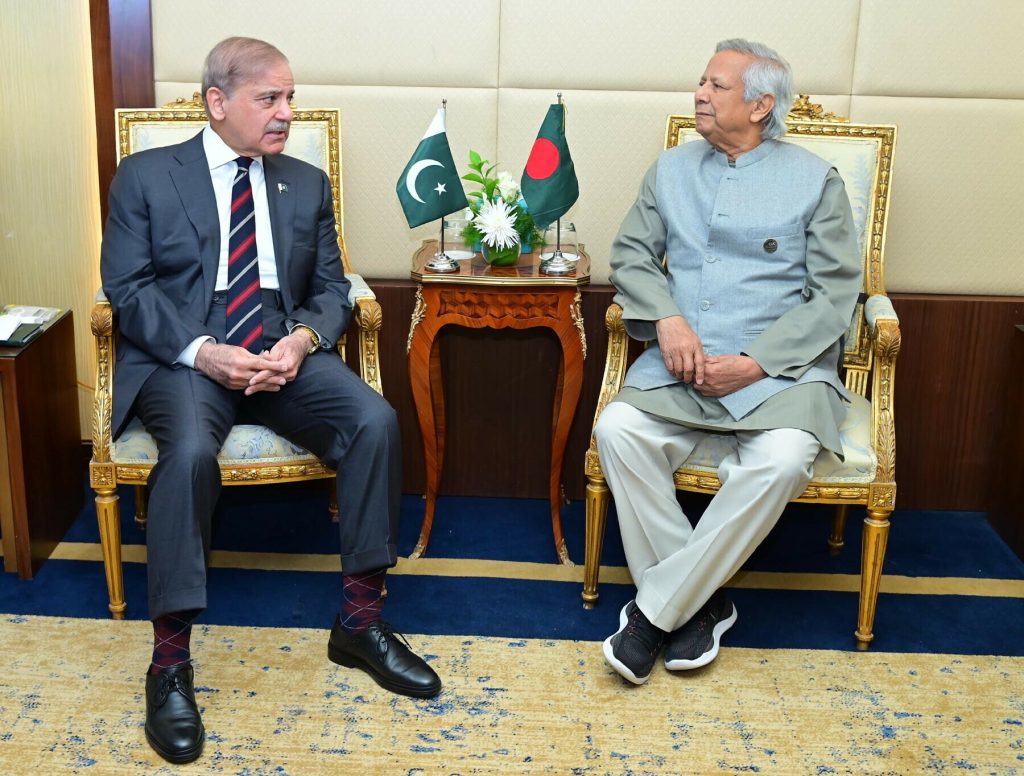
Last December, on the sidelines of the D-8 Summit in Cairo, Pakistan’s Prime Minister Shehbaz Sharif and Bangladesh’s Interim Chief Adviser Professor Muhammad Yunus. Photo: Collected
Q8. The Indian Army Chief has expressed concerns regarding any form of Pakistani presence in Bangladesh. How does Pakistan view these statements, and what is its official stance on such concerns?
Answer: Pakistan’s relationship with Bangladesh is rooted in history, culture, and the shared aspirations of our peoples. No external narrative can redefine the sovereign right of two independent states to cultivate peaceful and cooperative ties for their mutual benefit. Any approach that seeks to cast aspersions on this natural process is not only misplaced but runs counter to the principles of diplomacy and international relations.
Pakistan firmly believes that South Asia must move beyond the outdated paradigms of rivalry and mistrust. The destiny of this region should be peace and development, not competition for influence.
History has shown that sustainable peace is built on dialogue, not suspicion. Pakistan hopes that all regional states will recognise this and contribute meaningfully to an environment where economic progress, connectivity, and mutual respect take precedence over hegemonic tendencies. The world is moving forward, and South Asia must not be left behind.
Q9. You recently visited Bangladesh. Did you ever imagine returning to Dhaka in the context of the new political environment? How do you perceive the changes in Dhaka’s leadership, and would you consider this an important turning point in your career?
Answer: Dhaka stands as a symbol of resilience and progress, and returning to this evolving political landscape presented an opportunity to further strengthen our bonds of friendship and cooperation.
Pakistan’s relationship with Bangladesh is rooted in history, culture, and the shared aspirations of our peoples. No external narrative can redefine the sovereign right of two independent states to cultivate peaceful and cooperative ties for their mutual benefit
Pakistan has always respected the leadership of Bangladesh. Political transitions are a natural part of a nation’s journey, bringing new opportunities for growth and development. At such moments, what matters most is the collective aspiration of the people to build a stable, prosperous future.
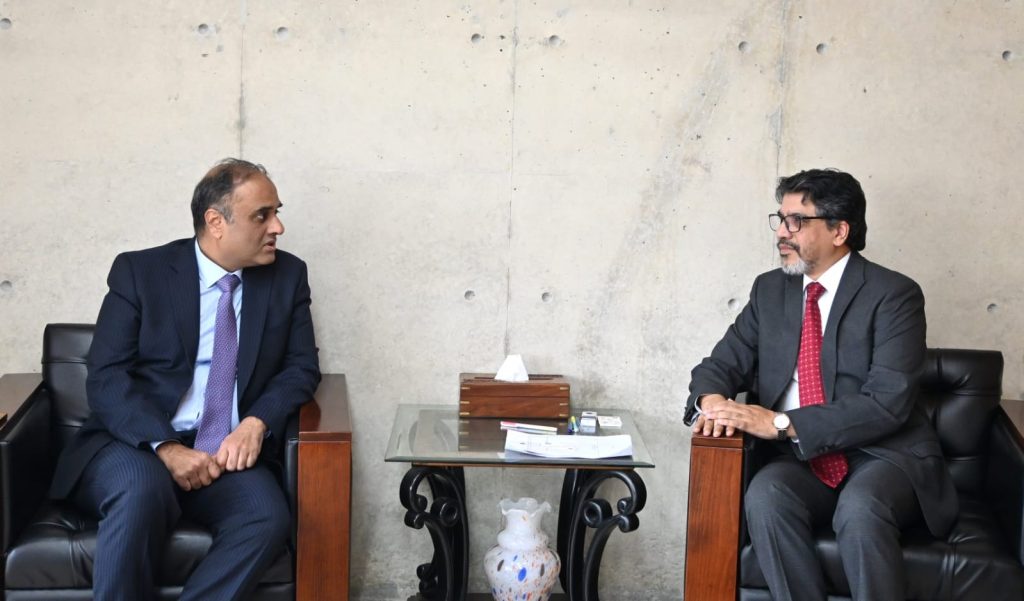
In March, Imran Ahmed Siddiqui met with Bangladesh’s Foreign Secretary Md. Jashim Uddin in Dhaka. Photo: Collected
We have great confidence in the wisdom and determination of the Bangladeshi people to come together in pursuit of their national goals. This moment is an opportunity to reaffirm the values of dialogue, cooperation, and shared progress. As always, Pakistan remains committed to promoting a constructive and forward-looking partnership with Bangladesh for the mutual benefit of our two countries and the region.
Q10. Many Bengali-speaking communities in Pakistan continue to face marginalised conditions, while Urdu-speaking communities in Bangladesh also encounter socio-economic challenges. What steps or policies do you believe can be taken to improve their lives and ensure better opportunities for both communities?
A: Pakistan remains committed to ensuring that all its nationals have equal opportunities to contribute to and benefit from national progress. The government remains attentive to the needs of all its citizens and strives to implement policies that promote inclusion and development.
Abdul Majid Chowdhury. I truly appreciate that you took the time for me despite your many commitments. Thank you.
Imran Ahmed Siddiqui: Thank you.
Abdul Majid Chowdhury is a sub editor at the International Desk of Daily Jugantor. He can be reached at amcshahriaronline@gmail.com
Imran Ahmed Siddiqui is the additional secretary for Asia and Pacific Affairs at the Pakistani foreign ministry and the former High Commissioner of Pakistan to Bangladesh.


